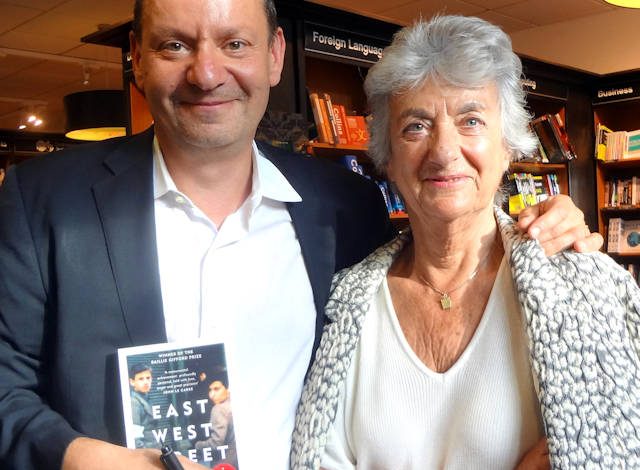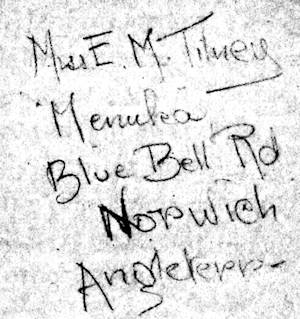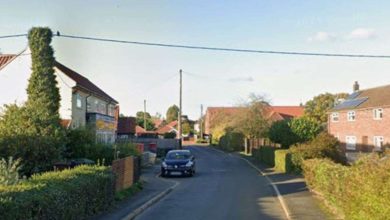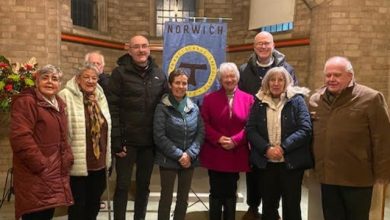Search for mystery home of Norwich wartime heroine

“All we know is that Elsie lived somewhere on Bluebell Road, Norwich,” says Prof Philippe Sands, QC, a London barrister and leading human rights lawyer, who describes Elsie’s extraordinary story in his international best-seller, “East West Street,” on the origins of genocide and crimes against humanity.
Prof Sands’ outstanding book is now in 15 languages and he was recently awarded an honorary degree by the University of Anglia. Famous author John Le Carre, describes Prof Sands book as ‘a monumental achievement.’
Prof Sands mother, Ruth, as a year-old baby, was rescued by Elsie Tilney, a Christian missionary, 78 years ago, when many Jewish families were being sent to concentration camps.
In 1939, as many Jews were being cruelly rounded up by the Nazis, Norwich-born Elsie risked life and limb in German-occupied Vienna to collect baby Ruth from her Jewish mother, Rita, at an Austrian railway station and take the child to relative safety in Paris, where the baby’s father, Leon, was then located.
There, Elsie handed the baby over to Leon, quickly writing her name and Norwich address in pencil on a scrap of paper, two inches square. It said simply: ‘Miss E.M.Tilney, ‘Menuka’, Blue Bell Road, Norwich, Angleterre.’
For more than 60 years, the baby’s father, Leon, treasured that slip of paper. After Leon died, the yellowing paper fell out of an old suitcase as Prof Sands was researching his family history. For two years, the scrap of paper hung above his desk as he sometimes wondered about the person who wrote it.
No-one has so far been able to find the house, ‘Menuka’, on Bluebell Road, where Elsie lived before the war.
Two years ago, Elsie was formally honoured as ‘Righteous Among the Nations’ by the official Holocaust remembrance authority at Yad Vashem in Israel – as one of those who risked their lives to save Jews during the darkest days of the war. Elsie was only the 21st British recipient of the honour.
Born in Norwich in 1893, Elsie Maude Tilney became a member of Surrey Chapel in 1903 as a ten-year-old. In 1919, as ‘a pretty young lady with a sweet mellow voice’ Elsie was a Sunday School teacher at the Chapel where she spoke of her great interest in Africa.
 Eventually Elsie became a missionary in North Africa, where she spoke of the love shown to her by Jewish families. Elsie worked in Algeria and Tunisia for more than a decade, but stayed in close contact with the Chapel’s pastor, David Panton, who wrote wartime articles denouncing Hitler’s ‘irrational and insane anti-semitic fury’ after The Times in 1933 reported a speech by the Fuhrer with the headline: ‘By Fighting Against The Jews I Am Doing The Lord’s Work.’
Eventually Elsie became a missionary in North Africa, where she spoke of the love shown to her by Jewish families. Elsie worked in Algeria and Tunisia for more than a decade, but stayed in close contact with the Chapel’s pastor, David Panton, who wrote wartime articles denouncing Hitler’s ‘irrational and insane anti-semitic fury’ after The Times in 1933 reported a speech by the Fuhrer with the headline: ‘By Fighting Against The Jews I Am Doing The Lord’s Work.’
Towards the end of the war, as Elsie continued to help Jewish families leave mainland Europe, the Germans sent her to an internment camp at Vittel, in northern France, along with hundreds of other foreign nationals.
Elsie’s selfless bravery grew out of her love for Jewish people – for example, for 16 months she hid a young Jewish soldier, Sasha Krawec, in a camp bathroom, thus saving him from being deported to Auschwitz with 400 other prisoners.
Elsie’s courage was immense, as she was selected to work in the German Commandant’s main office, sorting records. People who knew Elsie describes her as ‘a quiet, gracious lady, a remarkable, compassionate woman,’ deeply motivated by her love for Jewish people and her Biblical understanding of God’s purposes in human history, based upon such verses as Romans 1:16 and Romans 10:1.
One internee said Elsie was ‘one of the bravest people I’ve ever met.’
Prof Sands was greatly helped in his research on Elsie by the archivist at Surrey Chapel, Dr Rosamunde Codling. After the war, Elsie returned to missionary work in South Africa in the 1950s.
As far as we know, Elsie never spoke about her wartime bravery. Upon retirement, she went to Miami, Florida, to live near brother her Fred. She died in 1974 and her ashes were scattered over Biscayne Bay on the Atlantic Coast.
Philippe Sands is professor of law at University College, London. His book, East West Street, won the Baillie Gifford Prize for non-fiction in 2016. The book is part detective story, part family history, part legal thriller. Any reader who can shed any light on the location of Elsie’s former home on Bluebell Road, Norwich, is invited to contact the editor.
Read our previous story on this topic
Pictured above is Philippe Sands, QC, with his mother, who was rescued as a baby by Elsie Tilney; plus a picture of Elsie Tilney in 1920; copy of the slip of paper that Elsie gave to Leon after handing over the baby in Paris in 1939.
Read the full article here








